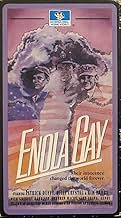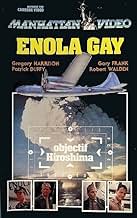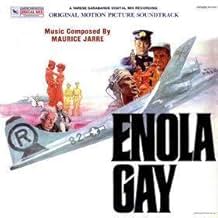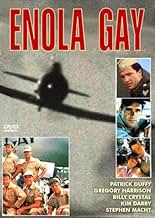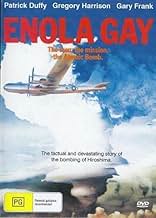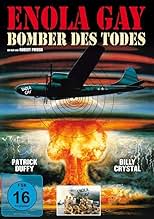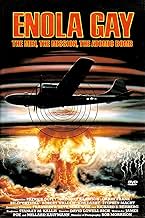Enola Gay
- Film per la TV
- 1980
- 2h 36min
Aggiungi una trama nella tua linguaThe decision to drop the atom bomb, the secrecy surrounding the mission, and the men who flew it.The decision to drop the atom bomb, the secrecy surrounding the mission, and the men who flew it.The decision to drop the atom bomb, the secrecy surrounding the mission, and the men who flew it.
- Regia
- Sceneggiatura
- Star
- General Groves
- (as Richard T. Herd)
Recensioni in evidenza
What was the attitude of the flight crews who dropped the atomic bomb on Hiroshima and Nagasaki? Where does the name Enola Gay come from? Is it true that one of the crew spent years in an insane asylum after committing this unspeakable act? Was the action justified? The book this is based on answers many of these questions.
The Japanese were using back door channels to find a way of surrendering with honor, or at least to surrender and preserve their Emperor. American diplomats were un-aware of these attempts. Presidential advisers estimated the cost of invading the Japanese islands in human lives (American lives) would be in the hundreds of thousands. How the numbers were arrived at is anybody's guess.
One of the crew members had a depressive personality and suffered an un-related nervous breakdown later in life. It has become urban legend that he went insane because of remorse following Hiroshima.
Enola Gay was the name of Colonel Tibbets' mother. It was common practice for bomber crews in all the theaters of operation in World War II to name their aircraft after sweet hearts, wives or mothers.
The actors in this mini-series do a fine job in trying to express the attitudes of WWII flyers and ground crew. It is a fine adaptation of the book and the preparation of the mission and the top secret nature of the job given to those young men is an important story that sheds light on why the bomb was dropped on human beings.
I assumed that I'd seen an unrepresentative section so watched a repeat. In a knockabout comic scene in "the john" a security man disguised as a plumber has been caught by the aircrew listening in to their conversations. The scene exactly resembled that in those many many comic movies set the armed forces - from Operation Petticoat to Sargeant Bilko. How could such a huge, dramatic and sombre story receive such treatment? It was not simply incompetent but given the gravity of the subject matter, distasteful.
I contrasted it with the superb Emmy-awarded "Day One" with Brian Dennehy as General Groves, a military bulldozer whose responsibility it was to drive the immense project forward often in the face of the sophisticated scruples of the brilliant scientists he had no choice but to work with. Day One seemed to give absolute full and accurate measure to the characters and events - the first IMDb review on it is particularly worth reading. David Strathairn excellent as Oppenheimer. Even better was the 1980 mini series "Oppenheimer" with Sam Waterston in the title role.
Given these two superb renderings of the genuinely world shattering story I cannot imagine how "Enola Gay etc" came to be conceived let alone made. Rightly it received not a single award nomination.
It was not until 1955 when Lewis, then an employee of a candy company, told a Japanese minister that he had written, "My God, what have we done?" in his journal. Lewis had only written "My God," but his attitude toward nuclear weapons had changed due to the daily fears of Americans during the Cold War that the Soviets were going to nuke a U.S. city. So he put an impromptu addendum on his written statement 10 years later.
Intercoms on a B-29 were used by pushing a button to talk and releasing it to listen. There was no recording of the crew's comments, and Lewis's "My God" was conveyed in written form only.
The movie was very interesting, although Lewis's asking "What is that funny name (Enola Gay) doing on my plane?" is shown in a more pleasant light than the actual incident, in which Lewis was very angry at Tibbets being named to take over the Hiroshima mission. Lewis had flown the first six missions of the previously unnamed B-29, but only Tibbets, the two flight weaponeers, radar countermeasure expert Jacob Beser and perhaps bombardier Thomas Ferebee knew what the bomb the Enola Gay was carrying was capable of. Lewis knew that the plane was carrying a powerful bomb but had no idea of the actual power that "Little Boy" had. No other regular crew member of the Enola Gay did either on that particular morning in August 1945.
I have read many books and have seen many films about the Manhattan Project and dropping the atomic bombs on Japan. This film gets the chronological timing wrong in several places and uses comic relief when none is required.
Bob Lewis is portrayed as an old buddy of Paul Tibbets, yet I do not recall ever reading or seeing any documentation that would support such a relationship. Tibbets was portrayed as saying he wanted to pick his own men rather than the ones selected by his superiors. In fact, Tibbets did indicate that he wanted to make personnel selections, but that was probably no more than thirty men he had commanded previously. A few of the men I remember he selected included his radio operator, bombardier, navigator, and two other enlisted men who actually flew with him on the mission.
The 509th Composite Group consisted of about two thousand men, so his personally choosing less than fifty of the two thousand was no big deal. It seemed the director, the writers, and the actors had little or no knowledge about the Manhattan Project and especially the 509th mission details. It seems a shame this film falls so short in these details.
Best wishes, Dave Wile
There is of course -- there MUST be -- some domestic drama in the story. In this case, it's the same as that envisioned in another feature about pilot Paul Tibbetts, "Above and Beyond." "Paul, I have something to tell you. The children and I will be staying at my mothers." "So you're leaving me?" "It just got too confusing." The wife is disturbed by -- well, let the experienced viewer pick the right answer. (A) Her husband's increasing distance and irritability due to his burdensome responsibilities; (b) Wendover AFB's plumbing is not up to snuff; (c) Paul Tibbet's plumbing is not up to snuff.
CORRECT! The film is a bit stretched out because of the domestic episodes, though they involve an appealing and quietly suffering Kim Darby, and because of semi-comedic efforts of Billy Crystal as an Air Force Lieutenant trying to ditch the bulky MP who has been assigned to accompany him as a bodyguard and watchman. In the course of their training at Wendover in the middle of Utah's Great Basin desert and later on Tinian Island in the Marianas, comic incidents take place, friendships are tested, and Lt. Col. Tibbets grows ever more contentious.
Some of the lesser characters deliver weak performances. Their unpracticed voices stand out like gastropods on their poduncles. But not the principals, like Patrick Duffy, Stephen Macht, or James Shigeta. There is a striking scene in which Duffy, as Tibbets, is disgusted with the recklessness of an old friend, Gregory Harrison, and snaps out to his commanding officer, Macht, that he wishes somebody could just get rid of Harrison. Macht turns slowly and looks up at him with surprise and an expression of dead earnest. "Really? (pause) Okay." Duffy, grasping the covert message, hastens to add, "No, no -- not that way."
The screenplay is adequate, not insulting. James Shigeta represents the view of the Japanese officer committed to the support of the emperor while others plot to depose Hirohito and continue fighting. His younger brother, a teen, is swept up in the Kamikaze and dies in an act of altruistic suicide. Impressive job by Shigeta. He writes his brother a poem, which is taken along on the last flight. Our conception of masculinity is stiflingly constricted. The Japanese pilots left poems and hand-carved dolls for their loved ones. The generals of Ancient Greece discussed the philosophy of aesthetics the night before battle. If our soldiers did anything like that, they'd have one foot in fairydom.
The continuity is flawed. Billy Crystal, playing the usual Jewish wise guy from Brooklyn, has been kept in total darkness about the mission, but enters a room in which a miniaturized and devitaminized Robert Oppenheimer played by Robert Walden, gives a thirty-second chalkboard explanation of a weapon only a graduate in physics could understand, and Crystal emerges from the room fully enlightened as to the nature of the bomb and his own inclusion in the mission to drop it. It would take longer than that to learn elementary basket weaving.
Nice shots of airplanes in flight. I wonder how many have been inside a B-29. It was a mammoth of the period by any standard and the most technologically advanced but it was a bitch to fly. Pilots nicknamed it "the beast." But, as gigantic as it looks, I managed to climb inside one at the museum at Wright-Patterson in Dayton, Ohio, and it was surprisingly crowded. You crawl around and bang your head.
Hard to tell how closely the film sticks to historical fact. I don't know, for instance, that Crystal and his new friend and former MP shadow have a shoot out in a Tinian cave and the MP is killed, prompting Crystal to brood, however briefly, over the meaning of life. And I was under the impression that the bomb had to be armed in flight by a naval officer, the US Navy not wanting to have this epic event depicted as an all-Army show.
In any case, the Enola Gay with Tibbet in the left seat dropped the bomb on Hiroshima. Three days later, Bock's Car dropped another on Nagasaki, and in a few days Japan surrendered and World War II was at an end.
Lo sapevi?
- QuizPaul Tibbets confessed that he had never any problems to sleep after dropping the bomb over Hiroshima. The Hiroshima bombardment killed less people than the raids over Tokyo pulled in 1945 and which caused the death of more than one hundred thousands of people.
- BlooperMajor Tom Ferebee has to unroll his autographed "Short Shot" money roll to help Colonel Paul Tibbets and himself remember the last name of Theodore "Dutch" van Kirk. In actuality the three men had flown over 40 combat missions together on the same crew in Europe, and it is highly improbable that either Tibbets or Ferebee, let alone both of them, would have forgotten van Kirk's name.
- Citazioni
Colonel Paul Tibbets: Improperly commandeered an airplane...
Captain Bob Lewis: I was on official business.
Colonel Paul Tibbets: Lost in the middle of a snowstorm...
Captain Bob Lewis: Do you expect me to control the weather?
Colonel Paul Tibbets: Didn't occur to you to use instruments...
Captain Bob Lewis: My compass was out, SIR.
Colonel Paul Tibbets: Set down in the middle of a corn field...
Captain Bob Lewis: It was on the approach to the airport.
Colonel Paul Tibbets: So why didn't you use the airport?
Captain Bob Lewis: Because I was out of gas! It was one gorgeous piece of flying.
Colonel Paul Tibbets: People are going to say that I was lenient on you because of our friendship. Don't even start to believe it.
Captain Bob Lewis: Oh, c'mon, Paul...
Colonel Paul Tibbets: You're dismissed.
- ConnessioniEdited into Cibo per squali (1991)
I più visti
Dettagli
- Data di uscita
- Paese di origine
- Lingua
- Celebre anche come
- Enola Gay - Bomber des Todes
- Luoghi delle riprese
- Acton, California, Stati Uniti(Arizona scenes)
- Azienda produttrice
- Vedi altri crediti dell’azienda su IMDbPro
- Tempo di esecuzione
- 2h 36min(156 min)
- Colore
- Mix di suoni
- Proporzioni
- 1.33 : 1

